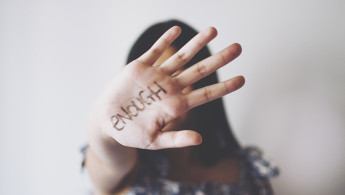Tunisia women 'not protected' by 'leading' domestic violence law: HRW
Tunisian women are still not being protected from domestic violence despite a "regional leading" law aimed at reducing such abuses being passed, Human Rights Watch (HRW) said on Thursday.
A report by HRW, entitled "So what if he hit you?: Addressing domestic violence in Tunisia" concluded that despite the country having one of the Middle East and North Africa's "strongest" anti-domestic violence laws, women are still not being protected in the country.
"Poor implementation of the law leaves women at risk of violence. The authorities fail to systematically respond, investigate, and provide protection to women who report violence, and a lack of funding for support services, such as shelter, has left many survivors with nowhere to escape," HRW said.
HRW researcher Kenza Ben Azouz, who wrote the report, said: "The adoption of Law-58 was an important and long-fought achievement to combat violence against women in Tunisia.
"Five years on, however, many women continue to face severe abuse by their spouses and other family members and are denied the protections and assistance owed to them from the authorities."
HRW interviewed over 100 people in Tunisia - among them 30 abuse survivors - between 2021 and 2022 on how authorities respond to domestic violence
"I feel like I am walking toward my own death," said one 40-year-old survivor who said her husband had beaten her using a brick, but authorities would not help her.
Most women, particularly those living in rural areas or who are illiterate, don't know the measures and services Law-58 provides to protect them, according to HRW.
This is partially due to "inadequate public information campaigns and signage", the rights group added.
Law-58, which was passed in 2017, allows women to apply for protection, including temporary measures police can ask prosecutors for and longer-term orders courts are empowered to make.
Courts can issue these orders without survivors having to lodge a criminal complaint or file for divorce.
Authorities seem not to be making widespread use of these orders, HRW said.
Tunisia opened 130 specialised police units under Law-58, providing them training to deal with such cases, but this is not enough, HRW said.
"Women said the police did not routinely explain to them their rights and options, responded dismissively to their complaints, or pressed them to reconcile with their abusers or acquiesce to family mediation rather than pursue a criminal complaint," the rights body warned.
The rights group said "police also often insist on arbitrary evidentiary requirements, such as a very recent medical certificate showing abuse" before they will agree to launch an investigation or ask for protection orders, despite Law-58 not requiring this.
The rape & murder of 19yo Chaima in 2020 sparked cries for action on violence against women in Algeria. But the femicide epidemic is not improving. In 2022 alone, 40 women were killed. Ali Boukhlef sheds light on grey areas in the country's Family Code https://t.co/u5KzgDToWH
— The New Arab (@The_NewArab) December 5, 2022
"When I got the police station, the police told me I could not do anything with my [four] medical certificates [issued in 2020 and 2021] because all of them had been issued more than 15 days ago," one survivor, aged 26, said.
"I am illiterate, and no one had told me my certificates would lose their validity after a couple of weeks."
Ben Azouz, the HRW report's author, said: "Tunisia can't rest on its reputation as the region's women's rights champion unless it walks the talk of its own laws and starts treating domestic violence as the serious crime it is.
"Many women have no way to escape from husbands, fathers and brothers who abuse them with impunity."





 Follow the Middle East's top stories in English at The New Arab on Google News
Follow the Middle East's top stories in English at The New Arab on Google News


